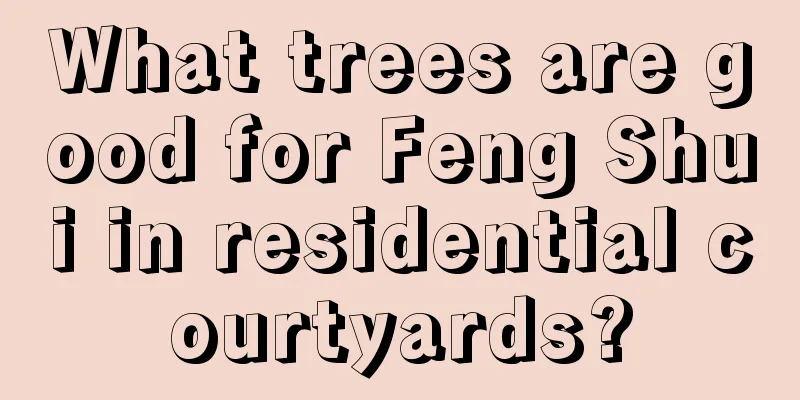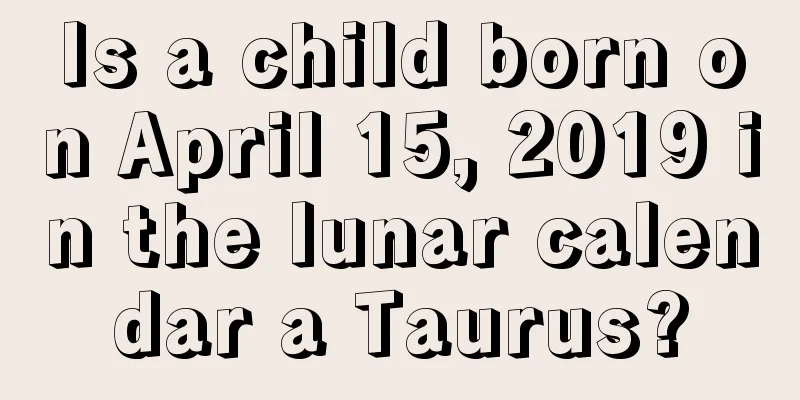What trees are good for Feng Shui in residential courtyards?

|
Introduction: Many people plant flowers, plants and trees in the green belts of their residential courtyards, which not only beautifies the environment, but also improves air quality and has a certain feng shui effect. However, it should be noted that there are certain methods and options for planting trees in residential courtyards. Some trees are suitable for planting, while others are not. Please see below for the specific content. Mr. Shui Mo will reveal to you the taboos of residential Feng Shui in this issue. The most suitable trees for garden planting are: Feng Shui considers a tree to be a lucky object for a variety of reasons. Sometimes it is based on the characteristics of the plant, and sometimes it is based on the plant's meaning or even homophony. Trees that are not suitable for planting in the garden:It depends on whether harmful gases or liquids will be discharged. For example, the strong fragrance of tuberose is not good for patients with heart disease and hypertension, the fragrance of oleander can easily cause drowsiness, tulips contain alkaline, and excessive consumption of them can cause hair loss, and so on. What kind of trees are good for Feng Shui in residential courtyards? 1. Palm, also known as palm tree. It has both ornamental value and its trunk can be used as pavilion pillars. The palm hair can be used as medicine, which has the function of astringing and stopping bleeding. It is mainly used to treat vomiting blood, metrorrhagia and other symptoms. It has the function of making money and protecting wealth in Feng Shui. It is best not to plant these trees in residential courtyards1. Cypress Cypress trees are evergreen and have strong vitality, so they should be very auspicious. But the problem is that this kind of Lord is often planted in Therefore, it is also called grave tree in cemetery. Planting cypress trees in a house is considered a taboo as it implies bad luck. 2. Plum Tree The "mei" in "plum tree" is homophonic with "mei", which means "me", so people believe that planting a plum tree in the yard will imply that the owner is lustful, unlucky in marriage and ruining the family. 3. Banyan Tree Many people believe that planting a banyan tree in the yard means that the tree is intolerant. Banyan trees usually have thick roots, so the underground roots are well developed, which often causes uneven terrain and makes the house unstable. Moreover, banyan trees are mostly found in cemeteries, so it is not suitable to plant banyan trees in residential houses. 4. Mulberry The "Sang" in "mulberry tree" is homophonic with "sang", which means "funeral", so it has become very unlucky. Seeing "mulberry" when going out is unlucky. But some people do not agree with this, so they plant many mulberry trees at home. 5. Willow It is taboo to plant willow trees in the yard. Planting willow trees will cause people to lose money because the homonym of "willow" is "flow", so planting willow trees will cause the family's wealth to flow out. There is another saying that people have long believed that willow is yin and attracts yin, which is a bad idea. In addition, willow trees do not bear seeds, and the word "zi" (zi) and "zi" (zi) are homophones for each other, which is very unlucky. 6. Poplar The leaves of the poplar are large and lush. When wind blows, they make rustling sounds. Therefore, there is a saying among the people that the poplar tree is named "ghost clapping hands". Therefore, for the sake of comfort, people generally do not like to plant poplar trees. Some people believe that poplar trees make loud noises when the wind blows, and they are likely to attract ghosts. 7. Peach Tree Peach trees are also very unlucky because the peach blossoms on them are blood red. People believe that the blood red of the peach tree means a little bit of blood, so no one would be willing to plant peach trees in their yard. Also, "tao" (peach) has the same pronunciation as "escape" (escape), so people may also think it means to escape. But from the perspective of Feng Shui, the peach tree is the essence of the five elements and can ward off all kinds of ghosts, so there is a series of items made of peach trees to ward off evil spirits. |
<<: Feng Shui fish suitable for people born in the Year of the Rooster
>>: Don’t underestimate the feng shui effect of the rice jar in your home!
Recommend
Will it rain in 2019? Analysis of climate characteristics of various regions during the Xiaoman solar term!
Introduction: Grain Full is one of the 24 solar te...
Can we go to the temple to burn incense during the Qingming Festival in 2019? What are the etiquettes of burning paper during the Qingming Festival?
Can I go to the temple to burn incense during the ...
Is the 21st day of the sixth lunar month in 2018 suitable for funerals? Does the fortune of the day show good?
Everything in our country, especially those relate...
When is the Summer Solstice in 2017? Where is the lucky position of the God of Happiness?
Introduction: In our folk legends, the God of Joy ...
Are babies born in the Bailu solar term in 2019 good? What is the fate of people born in Bailu?
The White Dew solar term means that the morning wa...
Is the lunar calendar date for the 2019 Spring Festival suitable for repairing graves? Is the Spring Festival the beginning of spring?
Introduction: In our country’s traditional customs...
What time is it on Grain Full Day in 2022? How to calculate the specific time of Grain Full?
Grain Full, like Rain Water, Grain Rain, Light Sno...
Is the 15th day of the third lunar month in 2019 a suitable date to start construction on a new house?
Introduction: According to the tradition of our co...
What is the fate of a baby chicken born on September 25th of the lunar calendar in 2017?
Introduction: Although each child cannot choose th...
Dragon Boat Festival wedding celebration couplets with horizontal banner
When the Spring Festival comes every year, every h...
Can I get engaged on the Great Heat of 2018? What are the auspicious and unlucky days?
For two people, engagement is only second to marri...
Is it okay to get a marriage certificate on May 26, the first day of the first dog days of 2020? What is the temperature in the dog days of 2020?
Introduction: Generally, you need to choose an aus...
Is it possible to move house on the ninth day of the sixth lunar month in 2017? Is it suitable for moving into a new house?
1. What day is the ninth day of the sixth lunar m...
Feng Shui Stories: The Legend of the Feng Shui Ornament "Jade Cabbage"
Introduction: Jade cabbage is a jade handicraft. ...
Can you travel far away on the ninth day of the ninth lunar month in 2021? What is your fortune?
The purpose of traveling is to make the things you...









